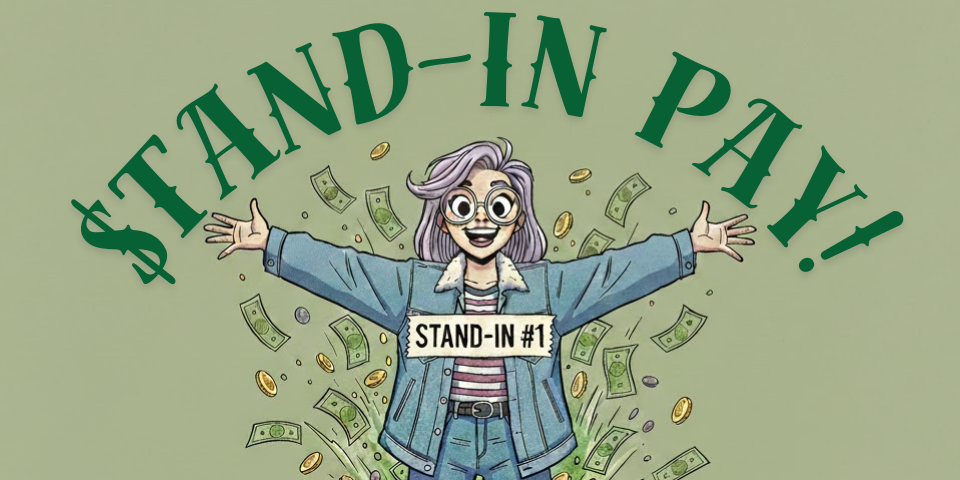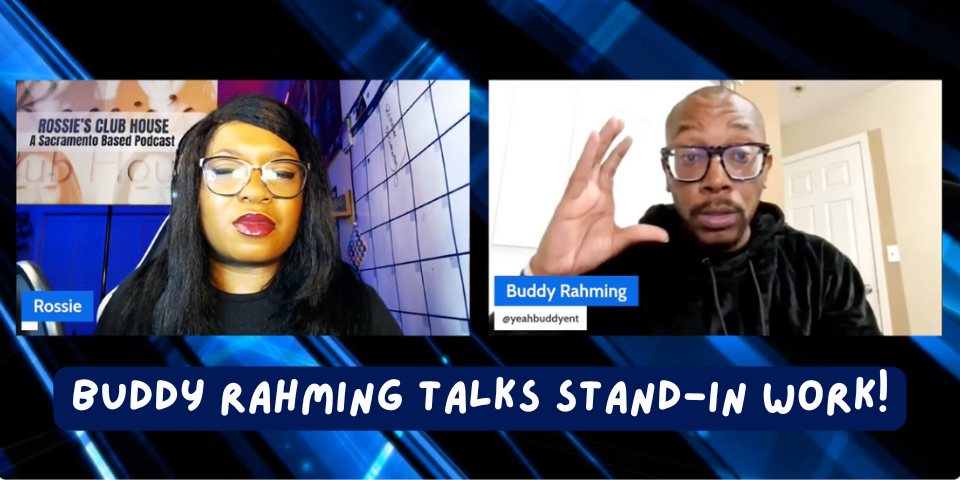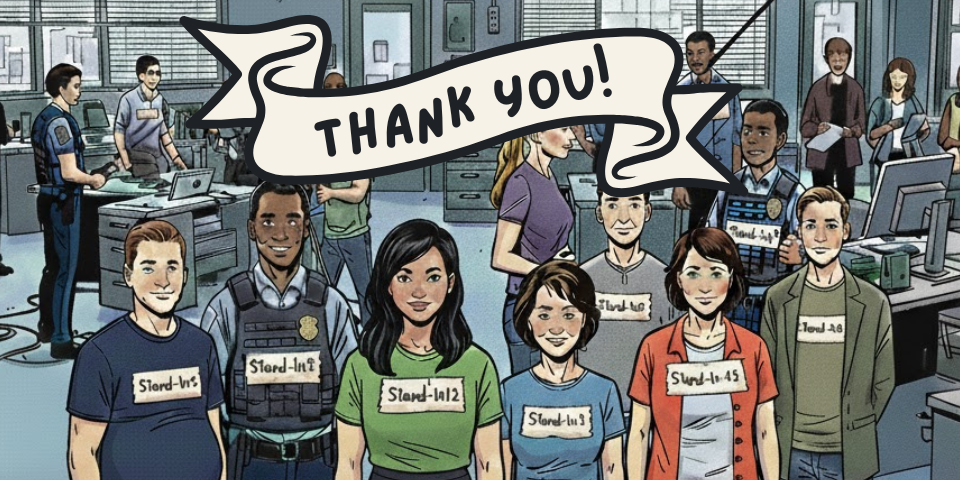Last week, we talked about what constituted “minimum stand-in work,” and what constituted work above and beyond that minimum. The driving point was the question:
What conditions around stand-in work warrant being paid above minimum?
Negotiating for yourself is key, and knowing your value — that is, knowing what you want to be paid for work above minimum stand-in work — is your first step. But just because you know your value and are willing to ask for it, that doesn’t mean it’s an easy road to secure that additional compensation.
In the second part of this two-part post, we explore some of the hurdles to getting above minimum rates for your stand-in work — as well as some methods for getting over those hurdles!
The Trouble of Getting Anything above Minimum Rates
The trouble in getting a higher rate or additional compensation for your stand-in work may be that some people don’t seem to entertain paying stand-ins anything above minimum rates.
Inevitably, it’s going to be the production (or the studio or network above the production) that’s going to have a say in whether you are allowed to be paid more for your stand-in work. But aside from their saying no, there may be others along the way who may preempt your ever being considered for a higher rate.
Who might those people be?
Casting Directors
Casting directors are like a filter: They are the ones largely responsible for presenting to productions qualified stand-ins. They may have some power to hire you, but mostly they present options to productions and productions make their stand-in selections.
When it comes to an important stand-in job, a casting director will usually screen you. Typically, stand-ins are screened for their height, their hair color, their skin color (or what they can portray), as well as their level of stand-in experience. Your interest in the job and availability for it is also a factor. As a stand-in candidate, you may meet some or all of those qualifications, and you may be presented with a job offer from the casting director.
If you are interested in the job, and if you either know the value of your experience or know this job will demand more than minimum stand-in work, then when the casting director calls you with a job offer is the time you would likely want to ask for a rate that would make you happy to do this job. Most of the time casting directors are doling out minimum rates, so being presented with a request for a rate higher than minimum would be not unheard of, but unusual, for most stand-in casting directors.
So what does the casting director do with your request? This is where it gets interesting for the stand-in. If the casting director takes the time to go to production and ask for your rate, you are dealing with a casting director who is at very least helpful to your cause of making more than minimum. But if you are dealing with a casting director who will not ask for your rate, you are up against a casting director who is possibly problematic to your job interests.
A casting director could choose not to ask a production for your requested rate for a number of reasons or excuses — laziness, disbelief a production would accept a request for more money, busyness booking talent, or something else entirely. What matters to you is whether production is asked at all.
So if a casting director won’t help you in your effort to be paid more than minimum as a stand-in, that’s one blockade, and perhaps the first. But if you can get the casting director to make the request to production on your behalf, you might be blocked for other reasons.
Accounting
Productions have accounting departments that may put the kibosh on any above-minimum rate for stand-ins, even with a convincing plea.
These same accounting departments probably deal with crew members and other actors who are working negotiated rates above minima for their respective union CBAs. If that’s true, then why are stand-ins so hard pressed to get a higher rate, even if they have demonstrated the value of their work and experience?
Of course, there may be higher players involved in the suppression of negotiated rates for stand-ins. Production companies may have policies around the payment of players like stand-ins and general background, which may be more or less incontrovertible except in extreme situations or in the face of union pressure.
The question becomes whether a higher rate for an experienced and valued stand-in can be “accounted for” in a different way? If accounting says that stand-ins can’t be paid higher than minimum, can you possibly be reclassified on the books as something else entirely that pays better?
For example, if you wanted more as a stand-in who was also going to be doing lots of photo-double work, you might be unhappy with the minimum rate for all of this responsibility and headache. You might find that the rate you want is, say, akin to the same rate a body double would make for the day. If you said to accounting (or more likely, to someone with power in production), “What about not giving me a higher rate as a stand-in who photo-doubles, but instead the minimum rate as a body double with me doing stand-in work under that title. Would that fly for accounting?”
While it may sound ludicrous to be granted more money simply by reclassifying your stand-in work under a higher-paying job, it has worked before. It seems to be because productions can justify paying a body double minimum, but can’t justify paying above-minimum for, say, stand-ins.
In other words, it would look fishy to pay a stand-in above scale, but not at all fishy to have a body double employed at all, especially if that body double is paid scale, too.
Other Negating Factors
Of course, there could be other factors than casting directors and accounting departments getting in the way of your securing more money as an experienced stand-in.
ADs might receive your request for a higher stand-in rate — and also say no before going to a higher authority. It may be that ADs are looked upon more highly by the productions that employ them if they aid in keeping production costs low. Saying yes to exceptional demands for money — as might be the case in a stand-in asking for more than minimum — might compete with their reputation as a cost-saving AD. It might be easier for them to ignore your request or flout it because they are saving themselves trouble — the trouble of asking for more and the trouble of driving up costs.
Working as a day-player on a production may also make it harder to ask for a higher rate. Say, for instance, you are a regular stand-in on a production, only that you don’t work every day on it. You probably are in a bargaining situation that would make it harder for you to ask for a higher daily rate than, say, the stand-in who is there essentially every day. Your experience might be valued — but not so valued that when you are there, you are worth that much more to production.
And Some Positive Factors
Aside from sticking up for yourself, some influencers might help position you better for a higher stand-in rate, especially when you are faced with a job that will definitely rely on your ability to do exceptionally well as a stand-in.
If an actor really wants you there, then that actor may find a way to make sure you are included. While that typically means being paid at minimum but with some amount of job security, it can mean that the actor can ask for the rate you want to do the stand-in work.
In rare cases, you might be put into the actor’s contract. In such a case, it would behoove you to make sure your minimum rate is established in that contract, and hopefully one that is above the CBA’s minimum. There are stand-ins for major star actors who are in their respective actors’ contracts. Some of them make principal rate for their stand-in work! It’s quite possible some of them make even more than that.
Coming in for another season on a job may offer you more leeway to get more money, especially if the production wants you back badly enough. It might be that you can’t negotiate much more than minimum in such a situation, but you might be able to negotiate at least a little bit more.
Granted, if you are working as a stand-in on another season of a television series, your minimum probably went up per the CBA (which usually has 2.5%-3% increases in rates each year if you are working on a SAG-AFTRA feature film). But rather than accepting that increase (which was a given), you might champion for a little more than minimum as a reward for valuable service to the production. Some productions might be open to such a request if they value you enough.
Final Thoughts
If you are a valuable stand-in, and if you know that you are valuable, stand-in work will start to demoralize you after a while, especially if you are only ever paid at scale. What will guard against that demoralization is if you are paid in a way that makes you feel more respected.
This is to say that if you’re an experienced stand-in, then you need to look out for your interests and see your value. If you regularly provide topnotch stand-in service, especially in a field of inept or inexperienced stand-ins who cause productions more trouble than help, then you are a commodity. And as a commodity, you deserve more pay.
When you start to find opportunities to ask for more pay, you might lose out on some stand-in jobs because some will say no to your requests. But if you regularly book work as a stand-in, you’ll realize that a lost opportunity that doesn’t pay appropriately is not really a lost opportunity but instead a matter of saving yourself. You save yourself from the demoralization of lower pay for more work, and you feel better in standing up for what you’re worth. You can earn the same amount and perhaps maintain your sanity better in taking other stand-in work. That said, you might even open yourself to greater opportunities that will pay you what you’re worth as an experienced stand-in.
So keep these posts in mind when it comes to accepting your next big stand-in job. And report back if they help you secure a higher than minimum rate for your work!
What is your opinion to the above thoughts on greater pay for experienced stand-ins? Do you have any other ideas for getting a higher rate? Share your thoughts below!
Discover more from Stand-In Central
Subscribe to get the latest posts sent to your email.






Leave A Comment